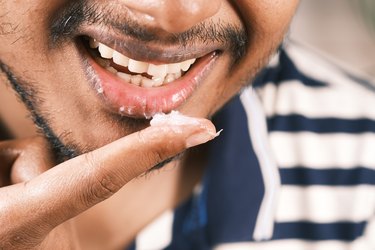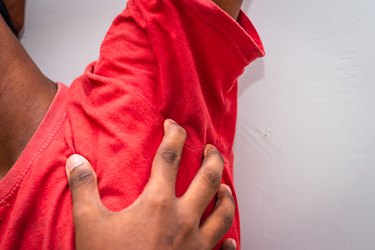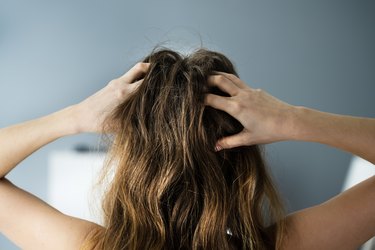
There's no denying it: Dry, chapped, itchy lips can be uncomfortable.
While most of the time itchy lips are just a sign that you need to invest in a better lip balm, sometimes the persistent prickly sensation can be an indication of a more serious health issue.
Video of the Day
Video of the Day
Here, Y. Claire Chang, MD, a board-certified dermatologist at Union Square Laser Dermatology, discusses the most common causes of itchy lips, plus ways to find relief from the itching.
Tip
When your lips are irritated, you’ll likely have the impulse to scratch or even to lick your lips. But resist the urge to do either, which will just make your lips red and more inflamed.
1. You Have Cheilitis
"Cheilitis [or chapped lips] is a general umbrella term describing inflammation of the lips that typically presents with redness, dryness, cracking, flaking and itching," Dr. Chang says.
You might also experience peeling, mild pain and sores on your lips and in your mouth, according to the Cleveland Clinic.
This common inflammatory lip condition can be triggered by many things such as chronic lip licking or an infection, Dr. Chang says. "Less common causes of cheilitis include nutritional deficiencies, including vitamin B and iron deficiencies, as well as autoimmune disorders," she adds.
Fix it: Treatment depends on the underlying cause. For example, if you have infection-related cheilitis, your dermatologist might prescribe an anti-fungal cream to cure your itch.
Or if you’re a lip licker, you can learn to limit the habit and use topical barriers (like petroleum jelly and other emollients, i.e., substances that moisten and soften your skin). Topical steroids can also help heal the inflammation, Dr. Chang says.
Other tried-and-true tips to heal itchy, chapped lips include, per the Cleveland Clinic:
- Stay hydrated
- Use lip balm or ointment as needed throughout the day
- Apply lip balm with sunscreen when outdoors
- Keep foreign objects away from your mouth (pens, jewelry, metal objects, etc.)
- Use a humidifier
2. You Have Allergic Contact Dermatitis
Allergic contact cheilitis is allergic contact dermatitis that affects the lips. Caused by contact with an irritating substance or an allergic response to it, contact dermatitis develops into an itchy, uncomfortable rash, according to the Mayo Clinic.
"This unpleasant lip issue can create an eczema-like reaction on or around the lips" leading to dryness, scaling and cracking, Dr. Chang says.
Common irritant or allergic triggers include, per Dr. Chang:
- Lipsticks, lip balms and other cosmetics
- Toothpaste, mouthwash and metals found in other dental materials/products
- Fragrances
- Preservatives
- Certain foods (for example, mango, citrus fruits and cinnamon)
- Certain medications
Fix it: “Avoiding the allergen or irritant is the best prevention and treatment,” Dr. Chang says. To help identify your particular triggers, she suggests speaking to your doctor about patch testing.
Patch testing involves placing sticky patches — which contain small traces of possible allergens — on your skin. If you develop a skin reaction to a particular patch, this may indicate that a certain substance is creating an allergic response.
In the meantime, you can soothe your itchy lips with topical steroids to get more immediate relief, Dr. Chang says.
3. You’re Taking a Certain Medication
Your itchy lips may be linked to what's in your medicine cabinet. Yep, certain medications can produce a prickly reaction in your lips. This is called drug-related cheilitis, Dr. Chang says.
Some common culprits include retinoids (like isotretinoin, acitretin and etretinate), antiretroviral drugs (such as protease inhibitors like indinavir), lithium and chemotherapy agents, she says.
Fix it: If you suspect your medication is instigating your itchy lip problem, consult with your doctor who may adjust your dosage or prescribe you an alternative medicine. When switching to a different drug isn’t an option, “frequent application of topical emollients can help,” Dr. Chang says.
4. You Have Eczema
Atopic dermatitis (also called eczema) is a chronic condition that produces dry, itchy and inflamed skin. And it can develop anywhere on the body, including the lips.
"Those with atopic dermatitis can have atopic cheilitis," Dr. Chang says. "These patients tend to have a personal or family history of atopy [i.e., the genetic predisposition to develop allergic diseases] including eczema, hay fever and asthma," she says.
Adding insult to injury, people with eczema on the lips are also more prone to allergic or irritant contact cheilitis, Dr. Chang adds.
Fix it: If eczema is affecting your lips, speak with your dermatologist. “Treatment [often] includes frequent emollient use and topical steroids,” Dr. Chang says.
5. You Have Herpes Simplex Virus
An oral herpes outbreak may be the origin of your itchy lips.
"Herpes labialis, commonly known as cold sores or fever blisters, are lip lesions that occur due to herpes simplex virus (HSV) infection," Dr. Chang says.
Herpes simplex 1 (HSV-1), the virus that causes cold sores, spreads through affected saliva or skin, according to the Cleveland Clinic. That means you can contract it by kissing or sharing food utensils, lip balm or razors.
"Cold sores typically present with small red blisters and crusting on or around the lips and are associated with tingling, burning or an itching sensation that can occur even before onset of the blisters," Dr. Chang says.
Certain factors can increase the frequency of fever blisters, she says. These include:
- Recent fever or illness
- Fatigue
- Emotional stress
- Excessive sun exposure
- Menstruation
- Immune suppression
Fix it: Unfortunately, there’s no cure for herpes. “Once infected with HSV, the virus remains dormant within the nerves and can be reactivated to cause recurrent symptoms,” Dr. Chang says.
But there are ways to make outbreaks more manageable. “Oral antivirals can be prescribed early in the course to decrease the duration and severity of cold sores,” Dr. Chang says. Topical anesthetics may also help alleviate symptoms.
And if you have a mild bout of fever blisters, you may be fine without meds entirely.
6. You Have Oral Thrush
A fungal infection may be initiating the itchiness in your lips.
"Oral thrush or candidiasis is a common oral yeast infection that is most commonly caused by an overgrowth of a fungal organism called candida albicans," Dr. Chang says.
Normally, candida fungus lives in your mouth without producing any problems, according to the Mayo Clinic. But when your system becomes imbalanced, it can lead to an overgrowth of fungus and foster unpleasant symptoms.
In addition to an intense itch, Dr. Chang points out that oral thrush can also create the following issues inside the mouth:
- Sensitivity or a burning sensation
- Whitish yellow, curd-like patches
- Red, inflamed areas
"A candida overgrowth can also cause angular cheilitis, which results in crusty, red, inflamed areas in the corners of the mouth," Dr. Chang adds.
Some people are more prone to oral thrush. For example, your risk for candidiasis increases if you take certain medications (including steroid inhalers or topicals and antibiotics), if you wear dentures or if you're immunosuppressed, Dr. Chang says.
Fix it: Candidiasis can be diagnosed by a doctor or dentist. “Oral thrush and angular cheilitis may be treated with topical or oral antifungals,” Dr. Chang says.
7. You Have Hives
Hives — a skin reaction that results in itchy welts — can happen anywhere on your body, including your mouth and lips. This scratchy skin rash usually occurs due to a specific trigger, Dr. Chang says.
Here are some of the most common, per the American College of Allergy, Asthma, and Immunology (ACAAI):
- Some foods (especially peanuts, eggs, nuts and shellfish)
- Medications, such as antibiotics (especially penicillin and sulfa), aspirin and ibuprofen
- Insect stings or bites
- Physical stimuli, such as pressure, cold, heat, exercise or sun exposure
- Latex
- Blood transfusions
- Bacterial infections, including urinary tract infections and strep throat
- Viral infections, including the common cold, infectious mononucleosis and hepatitis
- Pet dander
- Pollen
- Some plants
These triggers cause your immune system to release chemicals (such as histamine) that give rise to the itchy rash.
"Hives present with red, edematous [i.e., swollen with fluid] and itchy lesions that typically last less than 24 hours," Dr. Chang says.
Along with scratchiness, hives may also be associated with angioedema, a swelling around the eyes, cheeks, lips and tongue, Dr. Chang says. Angioedema can affect or restrict your breathing and may require emergency care, she adds. There are also forms of hereditary angioedema that will affect the lips or tongue.
Warning
If you experience hives accompanied by any of the following symptoms, seek medical attention; these maybe early signs of anaphylaxis, a severe, potentially, fatal allergic reaction:
- Dizziness
- Swelling of the tongue, lips, mouth or throat
- Trouble breathing
- Abdominal pain
- Nausea
- Vomiting
Fix it: The best treatment for hives is prevention. In other words, avoid your triggers. When that’s not possible, hives can be treated with antihistamines and, sometimes, steroids, Dr. Chang says. For anaphyaxis or other severe allergic reactions, an Epipen (epinephrine) may be prescribed.
8. You Have Actinic Cheilitis
Another source of itchy, inflamed lips, actinic cheilitis is caused by chronic, excessive exposure to the sun, Dr. Chang says.
Since the skin on your lips is thinner and has less pigment than other areas of skin on your body, it's more susceptible to sun damage, according to the Cleveland Clinic. That's why certain people — including fair-skinned folks, outdoor workers, seniors, individuals with albinism and anyone who lives in a region where the sun is stronger — are more likely to acquire actinic cheilitis, per the Cleveland Clinic.
While it typically affects the lower lip, you may experience the following symptoms in one or both lips, per the Cleveland Clinic:
- Dry, scaly or sandpaper-like skin
- Chapped, cracked, crusty skin
- White or yellow discolored patches of skin
- Swollen, thin or fragile skin
- Burning or numbness
- Pain, soreness or tenderness
Fix it: Actinic cheilitis is considered a precancerous condition as it can eventually develop into a type of skin cancer called squamous cell carcinoma, according to the Cleveland Clinic. So proper treatment is paramount to prevent a malignancy.
If you have any of the above symptoms, see your dermatologist regularly who can monitor you for early warning signs of cancer.
“To decrease your skin cancer risk, actinic cheilitis can be treated with topical chemotherapeutics or cryotherapy,” Dr. Chang says.
When Should You See a Doctor About Itchy Lips?
You'll often be able to ease itchy lips on your own by using topical emollients or moisturizers. If these strategies aren't effective "or if you have any additional associated symptoms [like swelling, bleeding or drainage], you should consult a physician to evaluate the cause and treat it appropriately," Dr. Chang says.
Was this article helpful?
150 Characters Max
0/150
Thank you for sharing!
Thank you for your feedback!
Is this an emergency? If you are experiencing serious medical symptoms, please see the National Library of Medicine’s list of signs you need emergency medical attention or call 911.


